Stephen Lironi: ‘Right now, there’s more rock and roll in kitchens than in recording studios’
A key figure in the Scottish post-punk scene, the artist became a renowned music producer in the United States, working with legends such as Hanson or Jon Bon Jovi. Today, he runs three restaurants with a Scottish heart and a Spanish soul in London. EL PAÍS spent some time with him to learn about his fascinating journey
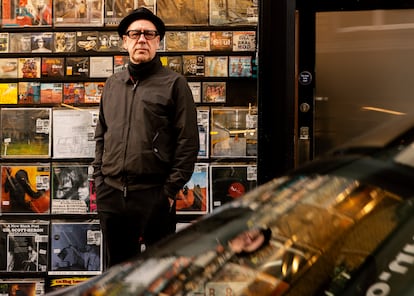
In the summer of 1974, a Scottish family decided to travel by car from Glasgow to Palamós, Spain. In the back seat, a 10-year-old boy named Stephen Lironi couldn’t imagine the effect his first contact with the Mediterranean Sea would have on him, two days after leaving his chilly hometown.
“That color, that water… that country, still under Francoism, seemed like another planet. Those squids. I still feel the taste of those squids in my mouth.”
Almost 50 years later, on the ground floor of Maresco, his restaurant – located in London’s tony Soho neighborhood – Lironi recalls that journey of initiation. His family trip is one of the reasons why he currently runs three establishments with a Spanish connection in the capital of the United Kingdom. But the Scotsman was not always a restaurateur. In fact, even today, he’s still not considered to be one.
“Let’s see… at 18, I was on Top of the Pops,” he recalls, referring to his first appearance on the most famous music TV show in the history of the BBC.
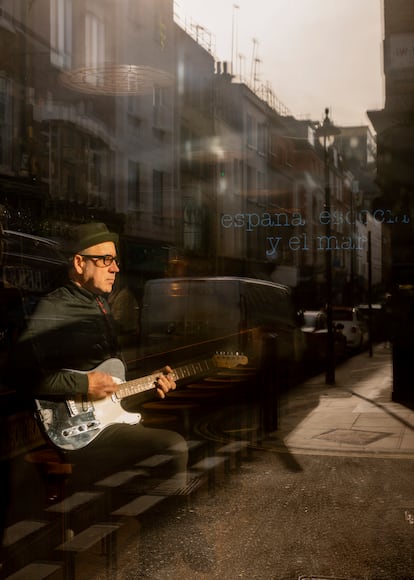
In 1982, Altered Images – one of Scotland’s most successful post-punk bands – faced an internal schism. The drummer and guitarist left the group. Rushing to find a replacement, the remaining members thought that the best candidate would be a lad who had been playing in various groups on the Glasgow scene.
“It was me, a guy who could play guitar and drums… two for the price of one. Cheap, very cheap,” recalls Lironi.
The now-restaurateur was one of those responsible for the band’s stylistic turn, which abandoned its more guitar-oriented sound to embrace elements closer to disco music. The third album by the band – titled Pink – was a huge success.
“I moved to Los Angeles,” recalls the Scotsman. At the time, within the ecosystem of the record industry, it was a symbol of status to move to California. There, he developed a long and successful career as a music producer. But one winter morning, 15 years ago, an article in The Guardian caught his attention. The piece explained how much of the best shellfish collected on the Scottish coasts ended up being consumed in Spain, where the crustaceans were more appreciated in bars and restaurants.
Suddenly, Lironi had an epiphany. He remembered that trip to Palamós when he was a child: the squid, the Mediterranean blue. He packed his things and returned to the UK, with the aim of setting up a restaurant that served Scottish seafood, cooked according to recipes from Spanish seafood gastronomy.
“I didn’t know anything about running a restaurant. In fact, I still don’t think I know anything. They asked me if the restaurant was going to have this or that, and I had no idea what they meant. All I knew was what I liked.”
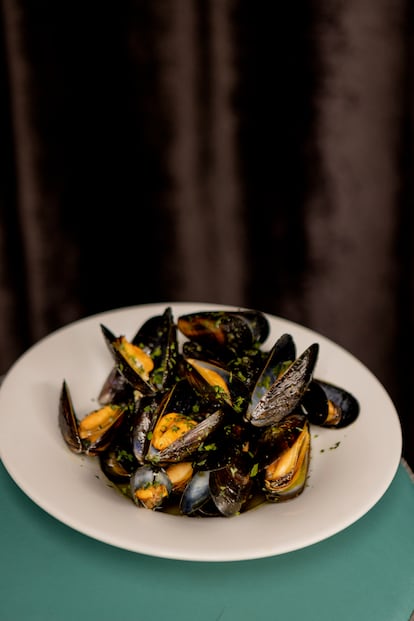
His first adventure in the world of restaurants in London was Bar Esteban – a kind of tavern that combined the two elements that, back in 2013, defined Spanish fashion in the UK: tapas and fine dining.
In the kitchen, Pablo Rodríguez (who apprenticed under Jean Luc Figueras) and, in the dining room, Naroa Ortega (formerly employed by Etxebarri, in Basque Country, one of the best restaurants in the world) helped Lironi turn his first venture into something of a success.
The next stop would be Scottish, where he would really bring to life his vision of mixing the seafood of his native Scotland with Spanish gastronomy. Located in London’s Stoke Newington neighborhood, the second restaurant, called Escocesa, soon became an institution. “I couldn’t even get a table myself,” recalls Lironi.
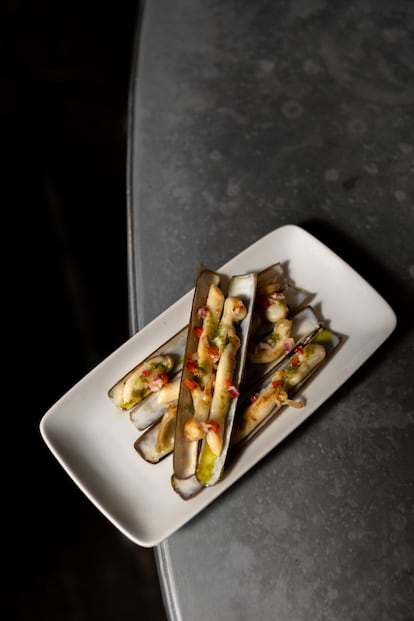
On one of the walls of Escocesa, a neon sign with the legendary message “Dream Baby Dream” – one of the most famous songs by the industrial punk duo Suicide – has been displayed since the opening. During his time as a music producer in the US, Lironi worked with the group – especially with their vocalist, Alan Vega. He brought the sign over from his home in the Hollywood Hills.
“I think right now there is more rock and roll in the kitchen than in the recording studio. More tattoos, more egos and more screams.”
And more drugs?
“I don’t know. I don’t think so. Look, I worked with very different people and almost never came across artists who were very screwed up by drugs. What really screwed us over was the mp3 [player]. Suddenly, we woke up one day and it was the most searched thing on the internet. In a matter of months, the record industry went to hell. For people like me – who live off our commissions from record sales, who don’t sell T-shirts or go on tour – it was a blow.”
Are you afraid that something similar could happen to you in the restaurant business? Is there a similar risk of obsolescence in this business?
“Not for me. But basically because I only know how to do one thing: restaurants that I like. I can’t follow trends. I’m only interested in being in charge of places that I would like to go to as a client. No matter how much time passes, I still feel like I’m oblivious to this. When they start cooking, I go solve problems away from the kitchen. It’s what I did as a music producer and it’s what I do in my restaurants.”
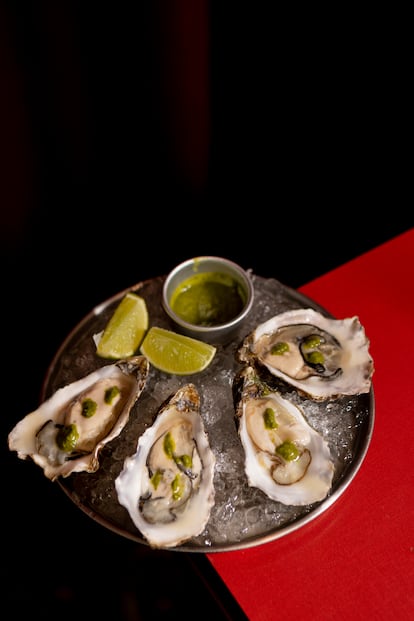
In the nearly three decades during which the Scotsman was at the heart of the record industry, he worked with people like Jon Bon Jovi and Hanson. Today, he feels distant from all of that. He hardly even goes to concerts anymore.
“I don’t know, I really like Glen Campbell. A few years ago I went to see him live and it was [a bore]. The band was like [a group of] civil servants – without passion.”
Lironi admits that he has always been very manic about the music he likes, distancing his personal tastes from work.
“I get excited about a song every two years. There are things that are released and they’re good… but I get emotional every couple of years. And now, not even that [often].”
Despite this disconnect, he returned to music production during the pandemic. It wasn’t difficult to find companions for the adventure, since he’s been married for almost 40 years to Clare Grogan, the former lead singer of Altered Images – the group with which he appeared on Top of the Pops.
“It sucks being in a group and in a relationship at the same time,” he sighs. “We didn’t start our romantic relationship until the band broke up. And here we are. What a miracle.”
At home, confined, they composed and recorded Mascara Streakz – an album starring Clare, who is a true pop icon in the UK, not only because of her musical past, but also because of her successful acting career. On the album, her daughter also sings… and the family dog makes a cameo.
“We did it all at home. We wanted to try it during the first lockdown, but the weather was too good. In the second lockdown, time was shit, so we dedicated ourselves to drinking wine and making music. And that record came out.”
Stephen travels four or five times a year to Spain. He says it’s for work, but today, he has a problem distinguishing work from pleasure.
“It’s just that, if they tell me that going to taste wines is work, well, I laugh. I don’t know,” he says with a shrug. His main concern is being able to hire staff – something that Brexit has turned into a hell. It weighs down on his business and has especially taken a toll on Maresco, his latest endeavor in the heart of Soho.
“Scotland didn’t vote for it. Every time some Brexit shit hits me, I remember that.”
Sign up for our weekly newsletter to get more English-language news coverage from EL PAÍS USA Edition
Tu suscripción se está usando en otro dispositivo
¿Quieres añadir otro usuario a tu suscripción?
Si continúas leyendo en este dispositivo, no se podrá leer en el otro.
FlechaTu suscripción se está usando en otro dispositivo y solo puedes acceder a EL PAÍS desde un dispositivo a la vez.
Si quieres compartir tu cuenta, cambia tu suscripción a la modalidad Premium, así podrás añadir otro usuario. Cada uno accederá con su propia cuenta de email, lo que os permitirá personalizar vuestra experiencia en EL PAÍS.
¿Tienes una suscripción de empresa? Accede aquí para contratar más cuentas.
En el caso de no saber quién está usando tu cuenta, te recomendamos cambiar tu contraseña aquí.
Si decides continuar compartiendo tu cuenta, este mensaje se mostrará en tu dispositivo y en el de la otra persona que está usando tu cuenta de forma indefinida, afectando a tu experiencia de lectura. Puedes consultar aquí los términos y condiciones de la suscripción digital.









































